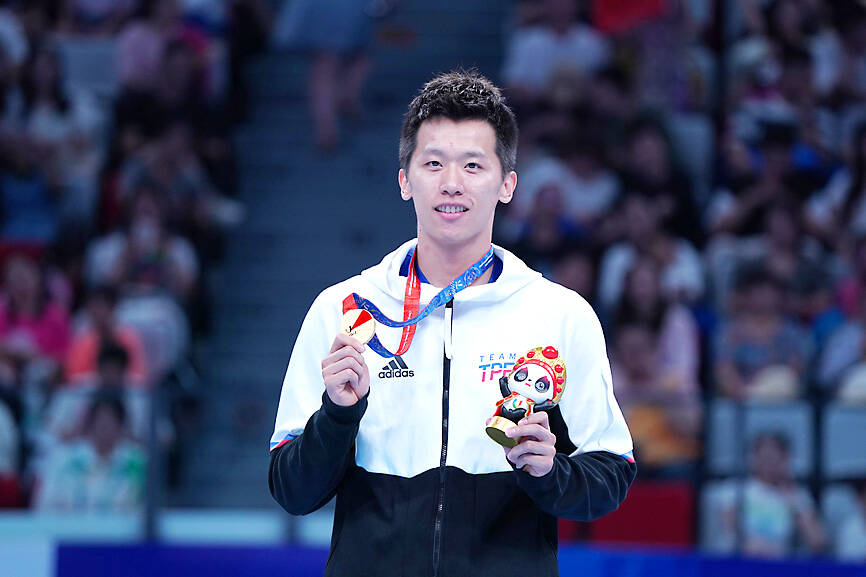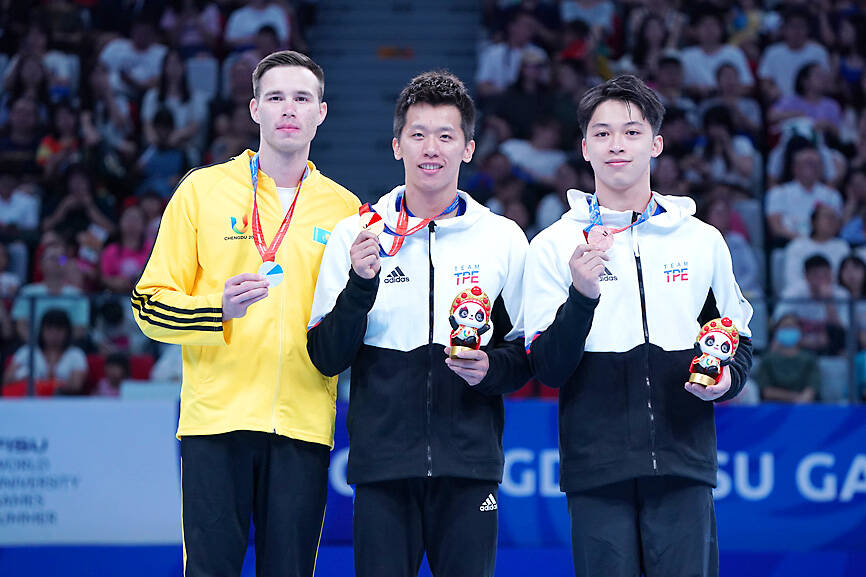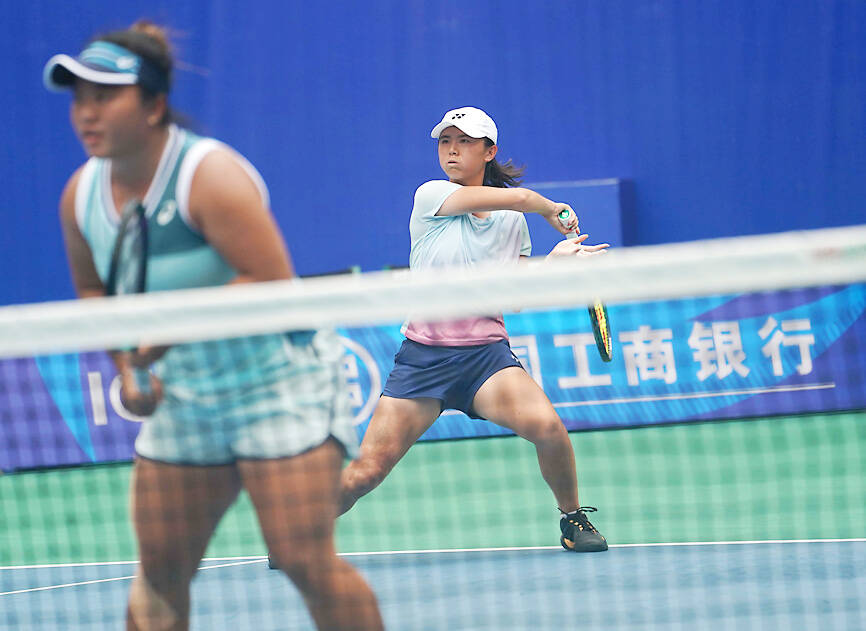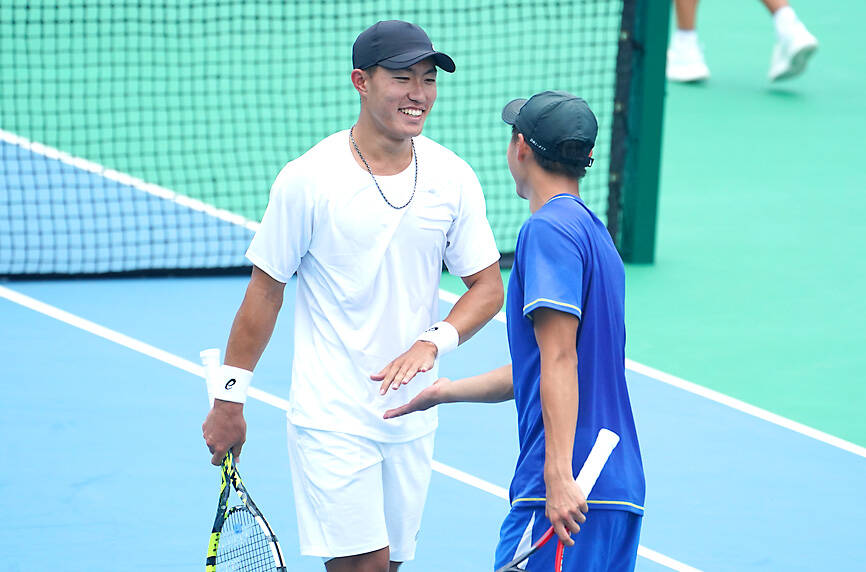Taiwan yesterday bagged three golds at the Chengdu World University Games in China, lifting the nation’s gold count to six.
Gymnast Lee Chih-kai (李智凱) took gold in the men’s pommel horse for the third time in a row, while compatriot Hsiao Yu-jan (蕭佑然) claimed bronze.
Lee, a 27-year-old Olympic medalist, scored 15.500 at the Dongan Lake Sports Park Multi-purpose Gymnasium, while Nariman Kurbanov (15.266) of Kazakhstan was second. Hsiao scored 14.933.

Photo courtesy of Chinese Taipei University Sports Federation
Lee on Friday dropped out of the men’s individual all-around event to preserve energy for the pommel horse and horizontal bar events yesterday. The horizontal bar final was ongoing at press time last night.
It was Lee’s third gold at this year’s event and Taiwan’s fourth in artistic gymnastics.
Lee’s coach Lin Yu-hsin (林育信) said that it “was definitely a world-class performance.”

Photo courtesy of Chinese Taipei University Sports Federation
He was initially given a score of 15.400, but the judges had failed to notice a difficult move he completed, so it was increased to 15.500 after Lin and Lee informed them.
Tennis players Liang En-shuo (梁恩碩) and Wu Fang-hsien (吳芳嫺) took gold in the women’s doubles, beating China’s Guo Hanyu (郭涵煜) and Jiang Xinyu (蔣欣玗) 7-5, 6-4.
The Taiwanese pair faced an uphill challenge in the first set after losing the first five games.

Photo courtesy of Chinese Taipei University Sports Federation
However, they turned the match around by winning the next seven.
Liang and Wu claimed Taiwan’s fifth gold of the Games and the second medal in tennis after 1 hour, 21 minutes on the court.
The Taiwanese pair guaranteed their place in the final by beating Kimberly Hance and Elise Wagel of the US 6-2, 6-2 in the semi-finals on Friday.

Photo courtesy of Chinese Taipei University Sports Federation
Earlier yesterday, 22-year-old Liang took on Guo in the women’s singles semi-finals, but lost 7-6 (7/5), 6-3 to claim bronze. In the second semi, Yang Ya-yi (楊亞依) beat France’s Alice Robbe 6-2, 6-3 to reach the final against Guo, which is to be played today.
Hsu Yu-hsiou (許育修) and Huang Tsung-hao (黃琮豪) won gold in the men’s doubles, defeating Jan Jermar and Victor Sklenka of the Czech Republic 6-3, 6-3.
Taiwan were seventh on the medals table at press time, with six golds, 14 silvers and 15 bronzes.
There are 210 Taiwanese athletes competing in 16 sports at the 31st Summer University Games, which ends on Tuesday.

The Taiwanese passport ranked 33rd in a global listing of passports by convenience this month, rising three places from last month’s ranking, but matching its position in January last year. The Henley Passport Index, an international ranking of passports by the number of designations its holder can travel to without a visa, showed that the Taiwan passport enables holders to travel to 139 countries and territories without a visa. Singapore’s passport was ranked the most powerful with visa-free access to 192 destinations out of 227, according to the index published on Tuesday by UK-based migration investment consultancy firm Henley and Partners. Japan’s and

NATIONAL SECURITY THREAT: An official said that Guan Guan’s comments had gone beyond the threshold of free speech, as she advocated for the destruction of the ROC China-born media influencer Guan Guan’s (關關) residency permit has been revoked for repeatedly posting pro-China content that threatens national security, the National Immigration Agency said yesterday. Guan Guan has said many controversial things in her videos posted to Douyin (抖音), including “the red flag will soon be painted all over Taiwan” and “Taiwan is an inseparable part of China,” while expressing hope for expedited “reunification.” The agency received multiple reports alleging that Guan Guan had advocated for armed reunification last year. After investigating, the agency last month issued a notice requiring her to appear and account for her actions. Guan Guan appeared as required,

Japan and the Philippines yesterday signed a defense pact that would allow the tax-free provision of ammunition, fuel, food and other necessities when their forces stage joint training to boost deterrence against China’s growing aggression in the region and to bolster their preparation for natural disasters. Japan has faced increasing political, trade and security tensions with China, which was angered by Japanese Prime Minister Sanae Takaichi’s remark that a Chinese attack on Taiwan would be a survival-threatening situation for Japan, triggering a military response. Japan and the Philippines have also had separate territorial conflicts with Beijing in the East and South China

A strong cold air mass is expected to arrive tonight, bringing a change in weather and a drop in temperature, the Central Weather Administration (CWA) said. The coldest time would be early on Thursday morning, with temperatures in some areas dipping as low as 8°C, it said. Daytime highs yesterday were 22°C to 24°C in northern and eastern Taiwan, and about 25°C to 28°C in the central and southern regions, it said. However, nighttime lows would dip to about 15°C to 16°C in central and northern Taiwan as well as the northeast, and 17°C to 19°C elsewhere, it said. Tropical Storm Nokaen, currently